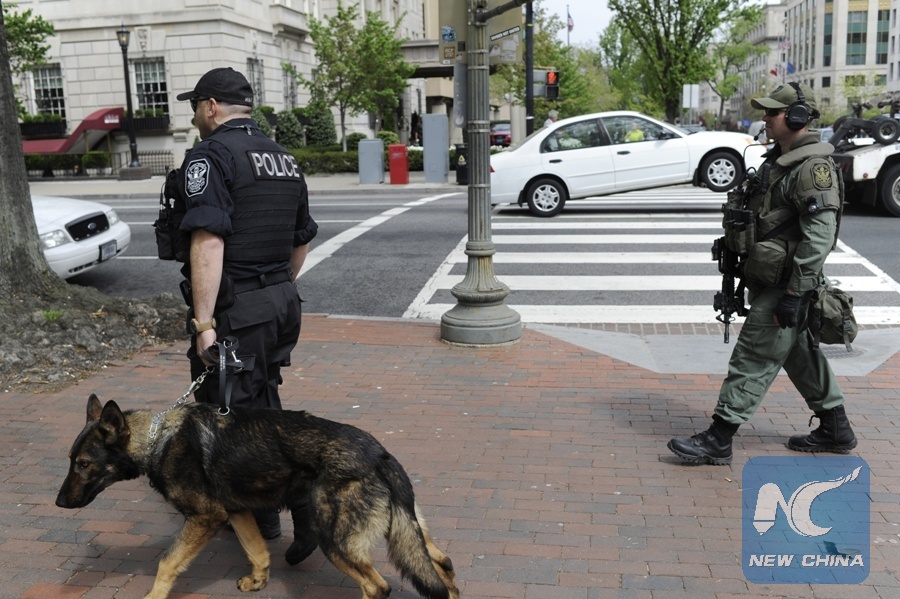
Two policemen patrol outside the White House in Washington D.C., capital of the United States, April 16, 2013. U.S. President Barack Obama said on Tuesday the FBI was investigating Monday's explosions at Boston Marathon finish line as "an act of terrorism." Xinhua/File Photo
CHICAGO, Sept. 11 (Xinhua) -- Despite all the recreations Chicago provided to its residents and tourists, Chicago Police had a difficult time this summer to cope with increased violence in the city, the third-most populous city in the United State.
According to the newly released data, only in the summer, 69 were shot, six of them fatally at the Memorial Day weekend; 66 were shot, five of them fatally at the Fourth of July weekend; and 65 were shot, 13 of them fatally at the Labor Day weekend.
In the past eight months, Chicago has recorded the bloodiest May in 21 years, the bloodiest July in 10 years, and the bloodiest August in 20 years.
While citing gang conflicts and the proliferation of guns for increased violence in Chicago, Chicago Police Superintendent Eddie Johnson further deliberated recently that in "impoverished neighborhoods, people without hope do these kinds of thing". He said "it's not a police issue, it's a society issue" .
Chicago Police Department has been doing all it can to combat violence rooted in "impoverished neighborhoods" , Johnson said, pointing to increases in gun arrests this year over the last year.
But he also admitted that the distrust between the police and African-American communities doesn't make it easy for his officers.
The distrust of police in these neighborhoods has to certain extent aggravated the situation.
Development of the distrust is a slow process. But it took a sharp turn in November 2015 when the video of police shooting of Laquan McDonald was released. The video told a different story from what the police gave.
Mass protests ensued across the U.S. afterwards, amplifying the distrust.
The fallout of the distrust is: homicides in Chicago this year have risen to levels not seen since the 1990s. There were 65 homicides in May; 99 in July and 92 in August.
By last Tuesday, the police department statistics put homicides in Chicago so far this year at 488, a 47 percent increase from 331 in the same period of last year and exceeding the 481 figure for the entire year of 2015.
It is notable that the homicide data collected by Chicago Tribune are higher than that provided by Chicago Police Department as the police excludes killings on expressways and those that are considered justifiable homicides, Chicago Tribune reported.
In contrast, Chicago Tribune' s Chicago homicides data hit 512 for this year by last Tuesday, as against 490 in the whole year of 2015.
Chicago is now on the path to 600 homicides for 2016, a threshold it has not reached since 2003. Chicago regularly recorded more than 700 murders a year in the 1990s as a result of gang violence.
Another fallout of the distrust is low clearance rate of homicides in Chicago, being about 30 percent at present. But if old cases are excluded, Chicago's clearance rate for 2016 homicides sharply drops to about 21 percent. Chicago police had solved just 92 of 432 homicides committed in 2016 by August 16, police statistics show.
A "reason for low clearance in gang killings are people just don' t trust the police," Chicago Tribune quoted Thomas Alexander, professor of University of Maryland as saying. Victims of crime would rather retaliate themselves than going with information to the police.
The fact is: in some impoverished neighborhoods in south and west sides of Chicago, residents see the police as adversaries rather than protectors.
Chicago is notorious for shooting that happens every day. And data show that the situation has gotten worse since this year, with shooting approaching 3,000 for the year. Increasing residents having the intention of moving out of the city.

